Maggie BreenIsaiah 58:1–12 † Psalm 51:1-17 † 2 Corinthians 5:20b—6:10 † Matthew 6:1-6, 16-21 Does God think we’re her keeper? It’s a bold question. I watched her go uncelebrated into the second grade, A greenless child, Gray among the orange and yellow, Attached too much to corners and to other people's sunshine. She colors the rainbow brown And leaves balloons unopened in their packages. Oh, who will touch this greenless child? Who will plant alleluias in her heart And send her dancing into all the colors of God? Or will she be left like an unwrapped package on the kitchen table -- Too dull for anyone to take the trouble? Does God think we're her keeper? It’s a clearly stated question? One we hear in the call of prophets and that we experience in the life of Jesus. It’s a question that calls to something deep within us. A central question about who we are responsible to and why? But it can be a frightening question. I know it’s one that I often hide from behind lots of concerns and anxieties. Things like:
And with all these anxieties, the yes inside of me that really wants to respond to this question ( on projection) will back off. But tonight, I want to suggest that we are in a safe place, a good place, to face this question head on. To move a little closer to our responsibility to ourselves, to each other and to the world. Tonight, in the gift that the church has given us in these Ash Wednesday traditions, a good place is created, as we are asked to face another bold and often frightening question. Do you remember that you are dust? And to dust you shall return? This question provides a tension that is helpful as we think about our work to faithfully engage our own gifts and the gifts of others so that we might together, all of us, know justice and peace. Do you remember that you are dust and to dust you shall return? This question wants to know if we will remember that we are not God, that we live and die like the rest of creation. That we are matter and molecule, woven into the cycles and rhythms of creation. Cycles that move through withering and dying and yet are infused with all else in creation at every step, every movement, with God-given promise and potential, with God given desire for growth and life. Growth and life that we did not create, and promise and potential which will move far beyond anything we can imagine or control. Hildegaard of Bingen, is a saint of the church, a woman who lived a millennia ago. She was a writer and a composer, a visionary and naturalist and someone who looked closely at the world, the death and life of it, the beauty and the horror of it trying to name the unstoppable force of life and light that she knew was God and that she could see pushing and coaxing, enticing and pulling everything towards life. She referred to this force, this drive, as greening. “There is a power that has been since all eternity and that force and potentiality is green” she wrote. This greening she said is a living and fiery essence…. That glows in the beauty of the fields and it speaks to the one who is listening saying – I shine in the water, I burn in the sun and the stars. Mine is that mysterious force of the invisible wind… I am the breath of all that is living.” This divine force. This drive to life is not tame, not containable. It moves to life even when we see death.
This force is in these ashes, in the palms they came from, in the powerful nutrients they hold for new growth. And it is in me and in you. It is planted deep in you and in your neighbors. You, me, our friends and strangers are brimming with, and we are deeply connected by a drive for life. We are each brimming with beautiful gifts for life that are holy and mysterious; just filled with gifts that are longing, begging to be offered for sake of our own lives and the lives of others. Gifts that are present even when the terrain feels parched and bitter, even when death is in process. We are not God. We are not the source these gifts; this drive for for life; these ideas, dreams, skills and yearnings that God plants in us and in the hearts of those arounds us. We cannot possibly in our own imagination know what these gifts were made for and where they will take us. But they are where life is found. They are where life is made full and they are ours to nurture. They are ours to pay attention for, to make space for and to respond to - in ourselves and in others. Yes, we are her keeper and the stakes are high. While there is limitless and mysterious potential, while the living waters of which we are a part will somehow find a way through the most arduous terrain, when we do not do what is ours to do - when leave these unopened, and when we live in ways that take up the room that others need to be able to offer their gifts premature, unnatural and unnecessary suffering and death result. So as a reminder of God’s work and as an invitation to consider our response the church has these ashes. They come from the palms of previous years. In these ashes reside a force of life that will not be extinguished. We’ll ask you to come forward in just a few minutes and to feel these ashes on your skin. On your forehead, or maybe on your hand if you would prefer. As you feel these ashes on your skin, remember that you are dust and to dust you will return. Remember and be liberated from any sense that you are responsible for God’s work, that you are being asked to take on more than is yours to do or that you have all the answers. Feel and remember that you are created, loved and claim by the God of all creation. And, as you feel this grit on your skin, remember that you are infused with life from a creator that connects us to each other and to all creation, and places in us and in all people, all living things gifts that need to be offered and honored for life to be full. And, as you leave this place with this earthen mark on your body, remember your role as a keeper of these gifts. As you settle into the work of Lent you might reflect and engage in some practices that help you look closely at the gifts that reside within you, and how to nurture and enjoy the gifts - the ideas, the dreams, the skills and yearnings that God plants in you. And you might work on just what it means for you to make space for equally valuable gifts that God has also planted in others. But beloved it you remember nothing else this night, remember you are a creature of a good and loving god – one who claims you in life and in death.
0 Comments
Leave a Reply. |
St. Andrew SermonsCategories
All
|
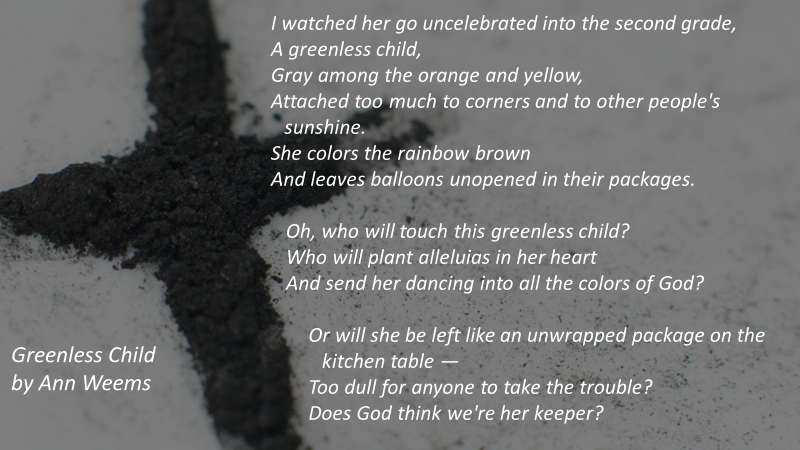
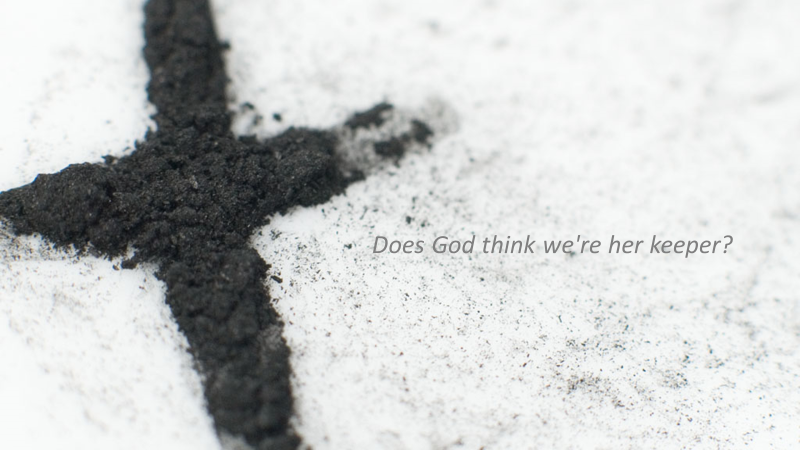
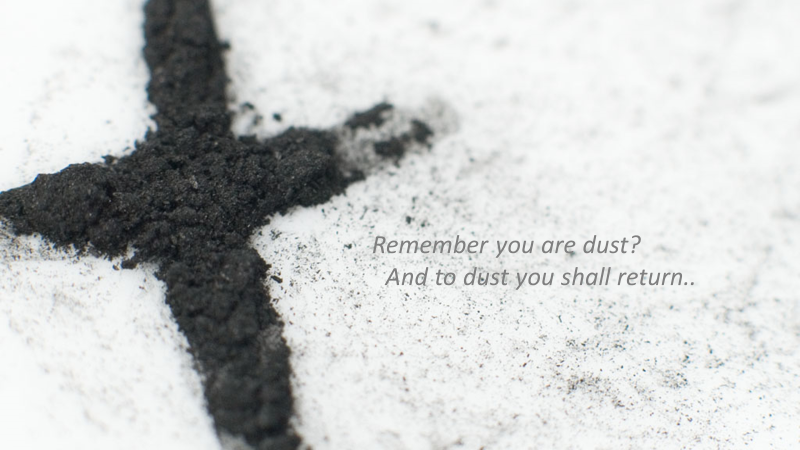




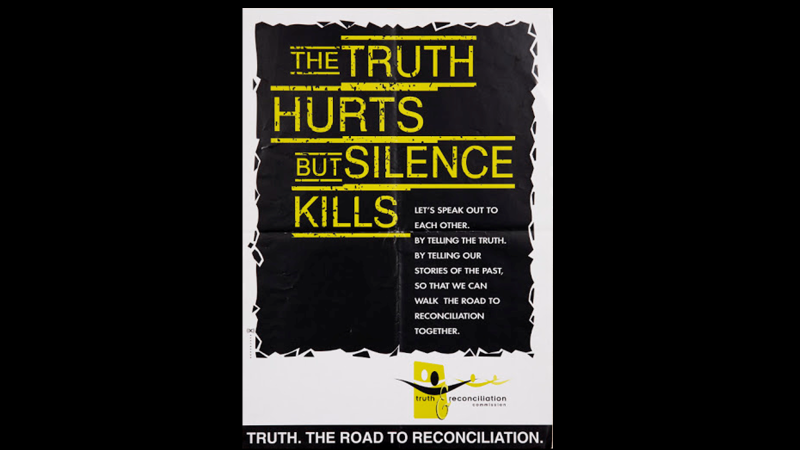
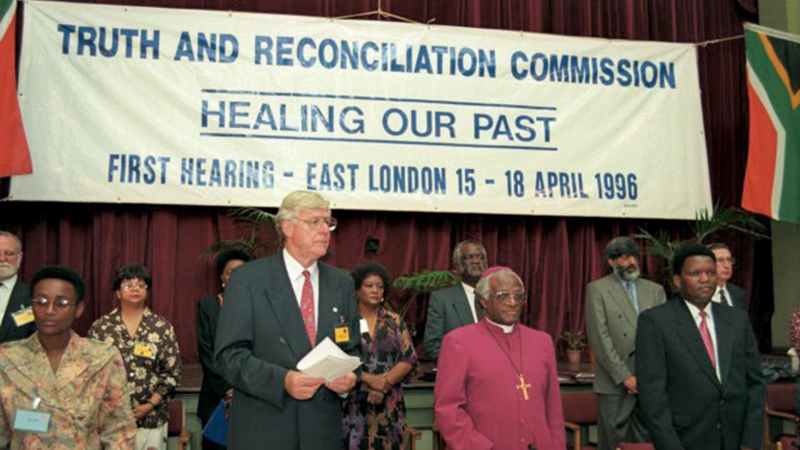
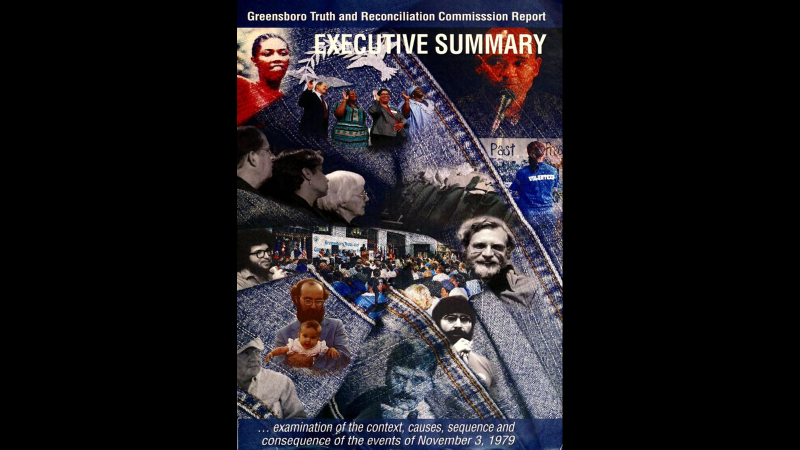
 RSS Feed
RSS Feed